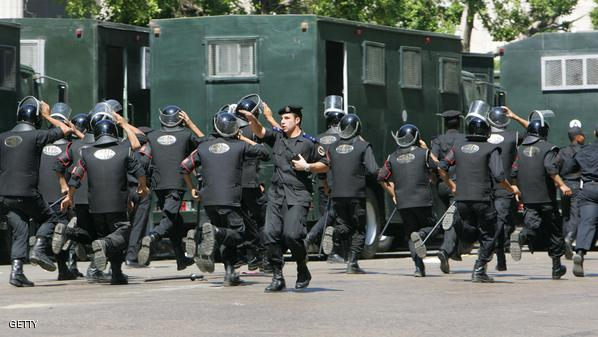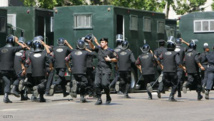The former army chief has led an extensive crackdown on the Islamist opposition and militants, vowing to eradicate Morsi's Muslim Brotherhood movement and jihadists.
But one year into Sisi's rule, his government was stunned by the assassination of state prosecutor Hisham Barakat on June 29.
Barakat's killing in a car bombing was followed by large-scale attacks on soldiers in the Sinai Peninsula, prompting the cabinet to rush through the law over the objections of rights groups.
"It's a disaster to see the state pass such a law in an atmosphere charged with calls for revenge," said Gamal Eid, a lawyer who heads the Arabic Network for Human Rights Information.
Article 33 of the cabinet-approved draft law stipulates a minimum two-year prison sentence for anyone who reports casualty tolls from militant attacks that stray from government figures.
The law came partly in response to coverage of militant assaults on soldiers in the Sinai on July 1.
The military said 21 soldiers were killed in the attacks, after several media outlets reported higher tolls from security officials.
"This is a dangerous article that violates the constitution," the Egyptian Journalists Syndicate said in a statement.
"It violates the reporter's right to seek information from various sources... it allows the executive authorities to act as censors, and the judges of truth," it said.
- 'A duty to protect' -
Government officials say the wording of the provision requires proof of "intent" and "malice" when reporting figures that contradict official statements.
"The government has a duty to protect citizens from false information," Justice Minister Ahmed al-Zind told AFP, arguing that the law should not be seen as "a restriction on media freedoms".
The new legislation also appears to grant police and soldiers impunity when carrying out "anti-terrorism" operations, saying they cannot be held criminally liable for the use of force.
Hundreds of soldiers and policemen have been killed in militant attacks since Morsi's overthrow, while at least 1,400 people, mostly Islamists, have been killed in a police crackdown on protesters.
While policemen have largely been cleared of wrongdoing in the deadly crackdown, the law would grant them further protection from prosecution over abuses, critics say.
Legal expert and lawyer Shaaban Said said police officers were already protected from prosecution over acts of violence committed in self-defence.
"The fear is that this law could allow police officers to act excessively or use disproportionate force against suspects," he said.
The draft law stipulates death sentences for the founders and financiers of vaguely defined "terrorist" groups, and five-year prison terms for promoting "terrorism" on social media.
Egypt's courts have already sentenced hundreds of Islamists to death in swift mass trials, although most have won appeals. Seven people have been executed.
At Barakat's funeral, Sisi asserted that "the arm of justice is chained by the law".
"We're not going to wait five or 10 years to try the people killing us," he said, asking judges present to speed up the process.
The draft law would reduce the number of appeals allowed to defendants, and set up special terrorism courts to expedite their trials.
But a judiciary council has asked the government to reconsider the proposed use of special courts before Sisi passes the law, saying that criminal courts can handle such cases.
----------------------------------------------------------------------------------------------------------------------
But one year into Sisi's rule, his government was stunned by the assassination of state prosecutor Hisham Barakat on June 29.
Barakat's killing in a car bombing was followed by large-scale attacks on soldiers in the Sinai Peninsula, prompting the cabinet to rush through the law over the objections of rights groups.
"It's a disaster to see the state pass such a law in an atmosphere charged with calls for revenge," said Gamal Eid, a lawyer who heads the Arabic Network for Human Rights Information.
Article 33 of the cabinet-approved draft law stipulates a minimum two-year prison sentence for anyone who reports casualty tolls from militant attacks that stray from government figures.
The law came partly in response to coverage of militant assaults on soldiers in the Sinai on July 1.
The military said 21 soldiers were killed in the attacks, after several media outlets reported higher tolls from security officials.
"This is a dangerous article that violates the constitution," the Egyptian Journalists Syndicate said in a statement.
"It violates the reporter's right to seek information from various sources... it allows the executive authorities to act as censors, and the judges of truth," it said.
- 'A duty to protect' -
Government officials say the wording of the provision requires proof of "intent" and "malice" when reporting figures that contradict official statements.
"The government has a duty to protect citizens from false information," Justice Minister Ahmed al-Zind told AFP, arguing that the law should not be seen as "a restriction on media freedoms".
The new legislation also appears to grant police and soldiers impunity when carrying out "anti-terrorism" operations, saying they cannot be held criminally liable for the use of force.
Hundreds of soldiers and policemen have been killed in militant attacks since Morsi's overthrow, while at least 1,400 people, mostly Islamists, have been killed in a police crackdown on protesters.
While policemen have largely been cleared of wrongdoing in the deadly crackdown, the law would grant them further protection from prosecution over abuses, critics say.
Legal expert and lawyer Shaaban Said said police officers were already protected from prosecution over acts of violence committed in self-defence.
"The fear is that this law could allow police officers to act excessively or use disproportionate force against suspects," he said.
The draft law stipulates death sentences for the founders and financiers of vaguely defined "terrorist" groups, and five-year prison terms for promoting "terrorism" on social media.
Egypt's courts have already sentenced hundreds of Islamists to death in swift mass trials, although most have won appeals. Seven people have been executed.
At Barakat's funeral, Sisi asserted that "the arm of justice is chained by the law".
"We're not going to wait five or 10 years to try the people killing us," he said, asking judges present to speed up the process.
The draft law would reduce the number of appeals allowed to defendants, and set up special terrorism courts to expedite their trials.
But a judiciary council has asked the government to reconsider the proposed use of special courts before Sisi passes the law, saying that criminal courts can handle such cases.
----------------------------------------------------------------------------------------------------------------------









 Home
Home Politics
Politics











